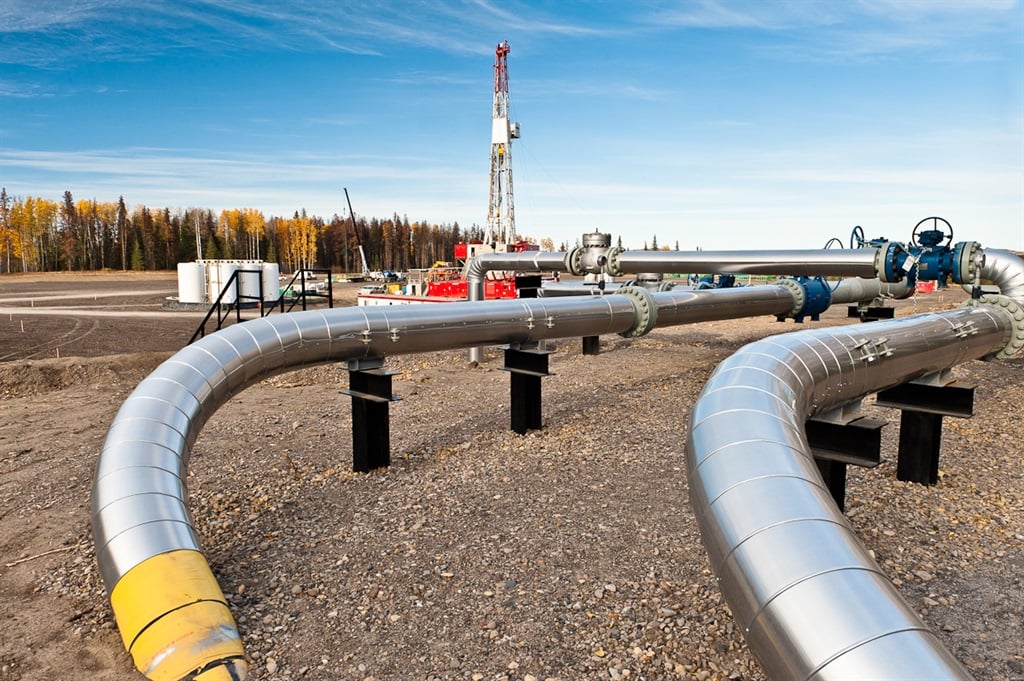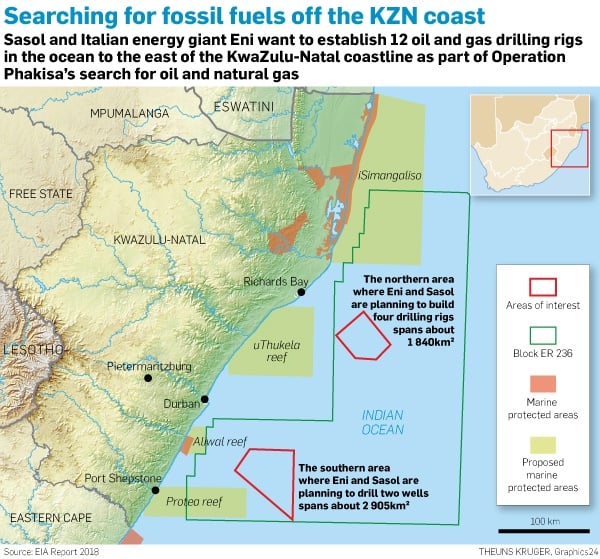
Eni and Sasol are stopped in their tracks by appeals against offshore gas and oil exploration – for now
Government’s ambitious, potentially lucrative and controversial plan to allow deep-sea exploration drilling for oil and gas off the KwaZulu-Natal coast will most likely be further delayed as 47 interested and affected parties this week filed appeals against the process.
Energy and Mineral Resources Minister Gwede Mantashe told City Press that the approach taken by those appealing the process “to obstruct each and every development” was “very selfish”.
“They are not thinking about the country, they are thinking about [their] narrow interests.”
Nevertheless, the appeals process had to go ahead, he said, and he was still banking on “game changing” gas reserves being found.
Given South Africa’s stalled economic growth and high unemployment rate, government views the project as a way to create jobs, plump up state coffers, boost growth, stabilise hydrocarbon prices and decrease South Africa’s reliance on imported resources.
“I am also hoping, wishing and praying that oil will be found so we don’t have to go around begging everywhere in the world,” said Mantashe.
Currently, Sasol pipes gas to South Africa from its Pande and Temane gas fields in southern Mozambique, but South Africa is intent on establishing a significant gas sector of its own to secure a stable, cheaper and cleaner energy mix.
Crude oil is South Africa’s largest import, making the country vulnerable to global events that affect oil prices and have a knock-on effect on the local economy.
“If we get enough gas, we can save these coal power stations that we all don’t want and change them into gas power stations, and keep the lights going and reduce emissions,” Mantashe told City Press.
The importance of gas as an energy source is shown in this year’s updated Integrated Resource Plan (IRP), which outlines the country’s proposed energy mix. The IRP, which was released last week, looks to add a further 1 000MW in 2023 and 2 000MW by 2027 through gas.
According to the IRP, government has taken a policy position to “support the development of gas infrastructure [and] convert all diesel-fired power plants to gas”.
The 47 appeals have been collated into one 331-page document with which the interested and affected parties are challenging the authorisation by the department of energy and mineral resources to allow multinational energy corporation Eni and Sasol to drill up to six wells for exploration in two areas about 62km offshore from Richards Bay and Durban.
Among the appellants are a dive centre, academics, environmental nongovernmental organisations, a documentary production company, an architectural firm, marine biologists and an eThekwini ward committee. The appeals were lodged in terms of the National Environmental Management Act.
The areas of interest for the exploration drilling fall in what is known as Block ER236, with the northern area covering 1 717.50km2 and the southern area covering 2 905km2. Eni and Sasol hold the exploration rights.
According to the environmental impact assessment (EIA), Eni may drill four wells in the northern area and two wells in the southern area, but it may not drill all of them and further exploration will depend on the success or failure of the first drill. The drilling depth is 3 800m to 4 100m in the northern area and 5 100m in the south. Water depths in the northern area range from 1 500m to 2 100m. In the south, the range is between 2 600m and 3 000m. The drilling of one well is expected to take up to 71 days to complete.
The areas in question are of interest because of recent substantial gas discoveries in northern Mozambique.
The department of environmental affairs has up to 60 days to reach a decision that, according to environmentalists, could profoundly affect the lives of citizens, sea life and the ocean if the appeals against the drilling fail.
Environmental attorneys Adrian Pole and Kirsten Youens filed their appeal on behalf of Wildoceans (one of the programmes run by Wildtrust), which said it was “disturbed by the quality” of Eni’s EIA.
Wildoceans said it had the assessment reviewed by three experts, who concluded that deep-sea offshore oil exploration was “a new frontier for the oil and gas industry” and the frequency of wellhead blowouts was expected to be greater in deep, high-current locations.
Should a wellhead blowout occur, it would be “nearly impossible” for the relevant South African authorities to swiftly respond to such a catastrophe. The experts also said the risk assessment done by the EIA consultants “significantly underrepresents the likely negative environmental impacts”.
Furthermore, the experts described the multinational’s oil spill modelling in the EIA as “highly unrealistic, with the predicted outcomes presented as a worst-case scenario actually being closer to a best-case scenario”.
Eni utilises individuals who are highly skilled and experienced in the oil and gas field, and says in its EIA that there are “limited” employment opportunities in the early stages of the project.
“This outlook is anticipated to significantly change based on the success of the exploratory well. True potential is realised at the subsea field development stage of the lifecycle [analysis],” the company said.
The South Durban Community Environmental Alliance is also against the projects. The group’s appeal makes a detailed case against the proposed drilling, including the claim that Eni’s EIA contains a “legally flawed assessment of risk and impacts of a catastrophic oil spill”, and that the EIA report was “fatally flawed because it failed to adequately assess socioeconomic impacts”.
“The economic impact of the proposed exploration on people who depend on the ocean for a living has not been considered,” said the group’s appeal submission.
READ: Sasol spends billions for gas
According to the activists, Eni’s own report recognised that “an unplanned event such as a spill could result in a loss of access to marine-based income-generating activities. The EIA report is found wanting in a number of respects, and the risks associated with this lack of information are massive. Consequently, in the face of this incomplete information, the department of energy and mineral resources should not have granted environmental authorisation.”
The appeal is almost certainly going to push back Eni’s anticipated plans to start the process next month, with a hope of finalising the appeal process before March.
According to government’s Operation Phakisa website, “South Africa’s coast and adjoining waters have possible resources of approximately 9 billion barrels of oil –equivalent to 40 years of South African oil consumption”.
“We also have 11 billion oil equivalent barrels of natural gas, which is equal to 375 years of South African gas consumption. However, there is significant uncertainty about the extent of these resources.”
A target has been set of drilling 30 exploration wells in 10 years, according to Operation Phakisa, which could, over the next 20 years, lead to the production of 370 000 barrels of oil and gas a day.
“This is about 80% of current oil and gas imports. The result would be 130 000 jobs and a contribution of $2.2 billion (R32 billion) to the country’s GDP.”
According to the department of environmental affairs, the responsibility of enforcing matters concerning pollution lies with the department of energy and mineral resources. In the event of an oil spill, environmental affairs spokesperson Albie Modise said there was an intergovernmental initiative under Operation Phakisa that would coordinate the action.
“There is a basic incident management structure to respond to emergency incidents in a coordinated manner. Among other things, they must ensure effective use and deployment of available resources for all types of emergency incidents,” said Modise.
He said that “each appeal is decided on its own facts and merits”.
Eni told City Press that “wherever” it operated, it undertook exploration activities according to “international best practice standards and in accordance with local laws, within the parameters set out by competent authorities and agencies, and engages in dialogue with stakeholders following locally determined norms, as well as recognised best practices”
.




 Publications
Publications
 Partners
Partners










